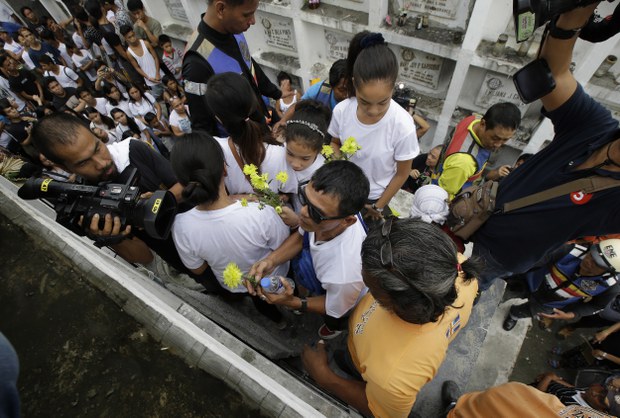Philippine officer guilty of killing teens in second-only drug war murder conviction
2023.03.14
Manila
 Carlito Arnaiz, center, father of Carl Angelo Arnaiz who was killed by police during former Philippine President Rodrigo Duterte’s drug war, offers flowers at the tomb of his son during a burial ceremony in Manila, Sept. 5, 2017.
Carlito Arnaiz, center, father of Carl Angelo Arnaiz who was killed by police during former Philippine President Rodrigo Duterte’s drug war, offers flowers at the tomb of his son during a burial ceremony in Manila, Sept. 5, 2017.
A Philippine court has found a police officer guilty of killing two teenagers in only the second conviction related to former President Rodrigo Duterte’s anti-drugs war that led to the deaths of thousands.
A Metro Manila court on March 1 found former Patrolman Jefrey Perez guilty of the 2017 murders and sentenced him to up to 40 years in prison without eligibility for parole, according to an 80-page court decision seen by BenarNews on Tuesday.
Judge Romana Lindayag del Rosario ordered Perez to pay a total of 690,000 pesos (U.S. $12,546) to the families of the victims Carl Angelo Arnaiz, 19, and Reynaldo de Guzman, 14.
“He is hereby sentenced to suffer the penalty of reclusion perpetua, without eligibility of parole,” the court said referring to Perez.
Perez’s fellow police officer, Ricky Arquilita, was also charged with the killings but he died in prison in April 2019.
The judge said both officers “performed separate but connected and cooperative acts indicative of their joint purpose and community of interest in ensuring the death of the victims.”
The case against Perez had dragged on for more than five years.
In November 2022, a court in Caloocan, a city near Navotas, had sentenced Perez to up to 40 years for torturing Arnaiz and de Guzman along with planting evidence.
The victims were last seen together getting snacks around midnight on Aug. 18, 2017.
Police claimed Arnaiz was killed in a shootout with arresting officers. They said officers were responding to a call for help by a taxi driver, who had allegedly been held up by Arnaiz. Police also claimed they found illegal drugs on Arnaiz, a former student at the University of the Philippines.
De Guzman, known as “Kulot” (curly), had been missing for weeks before his body, bearing about 30 stab wounds, was found in a creek in the northern province of Nueva Ecija 100 km (62 miles) away.
Human Rights Watch senior researcher Carlos Conde said while the court decision was a welcome development, it was more an exception than a rule, noting that it was “just the second murder conviction out of thousands of such cases.”
In November 2018, another Caloocan court sentenced three police officers to 40-year prison terms without parole for killing Kian delos Santos, 17, who was shot in the head during an anti-drug operation in August 2017.
“The Philippine government is now claiming that the recent conviction of a police officer in a ‘drug war’ killing is ‘proof’ that the justice system in the Philippines is working. That is a self-serving, misleading claim,” Conde said on Tuesday.
“While we are glad about the court’s decision and happy for the families of victims, this is hardly an argument against an ICC investigation and international accountability.”
The International Criminal Court (ICC) is investigating Duterte’s alleged crimes against humanity related to his war on drugs. The Philippines formally appealed to the ICC to overturn its decision to allow the investigation.
“Indeed, this is an argument precisely four such an investigation,” Conde said.
“This, if anything, highlights just how broken the criminal and judicial system in the Philippines is and underscores the need for a thorough and honest-to-goodness investigation and prosecution,” he said.
About 8,000 suspected dealers and addicts were killed in Duterte’s drug war during his time in office, according to police statistics. Rights groups said the figure could be three times higher, noting many others were killed by pro-Duterte vigilantes they suspect were working with police.







